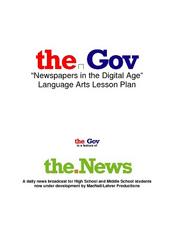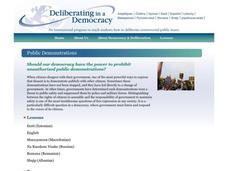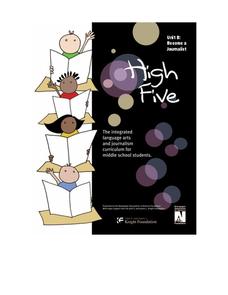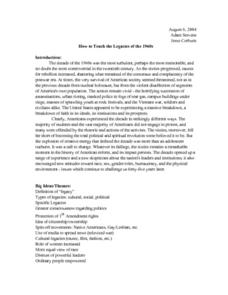Newseum
Civil Rights: Your Stories of Change
Young activists examine local civil rights issues presented in news media sites to determine what elements make these stories attention-grabbing and trustworthy. Using this information and their worksheets from the first two lessons in...
Annenberg Foundation
Controversial Issues in Practice
Wow! This resource provides three related lessons on the First Amendment that challenge US government students to explore their personal opinion on the separation of church and state. Each lesson can be adjusted in length, but is...
Administrative Office of the US Courts
US v. Alvarez
Is it illegal to lie about military service? Discuss the ways the First Amendment affects the Stolen Valor Act with a lesson that focuses on the Supreme Court case U.S. v. Alvarez. As high schoolers learn more about the history of the...
Teaching Tolerance
Journalism for Justice
Roll the presses! Or at least have your class members participate in the time-honored tradition of the student press by creating their own newspapers or journalist pieces on a social problem. After conducting research and collaborating...
iCivics
Drafting Board: Interest Groups
Does the influence of interest groups harm a political system? Your class members will analyze the role of interest groups in American politics, as well as consider the effect of perspective, bias, loyalty, and the First Amendment.
My Access
“Banning Books” Lesson Plan
To Kill a Mockingbird, Hunger Games, Brave New World. Welcome to Banned Books Week. As part of a study of censorship and book banning, class members investigate censorship, the purposes of censorship, and First Amendment rights,...
Curated OER
Imus: How much free speech is too much?
Students read background about Don Imus and his comments about the Rutgers women's basketball team. They explore current interpretation of the First Amendment, including that of commercial speech. Students present the findings to class...
Curated OER
Free Speech or Hate Speech?
Students see the difference between protected and prohibited speech as guaranteed by the First Amendment. They explain why free speech is essential to a democracy and consider how best to deal with speech they find offensive.
Curated OER
Progressive Reforms
Tenth graders analyze editorial cartoons focusing on progressive reform. They compare their analysis and research. Students discuss the cost of reform leading to the creation of a national income tax through the passage of the 16th...
National Constitution Center
Born in the U.S.A: Music as Political Protest
Though often used in shows of patriotism, Bruce Springsteen's 1985 song "Born in the U.S.A." is critical of America's role in the Vietnam war and its treatment of American veterans. High schoolers analyze the song's lyrics in an activity...
Curated OER
Newspapers in the Digital Age
Is journalism more or less reliable with the influx of Internet sources? Learners investigate the issues of freedom of speech, journalistic ethics, and social responsibility in the age of Twitter and Facebook. After examining the...
Deliberating in a Democracy
Public Demonstrations
Have you ever fought publicly for an idea you believe in? Scholars research and analyze the right to demonstrate peacefully. Incorporating different real-life scenarios as well as legal decisions exposes the concept of democracy and free...
Teaching Tolerance
Using Photographs to Teach Social Justice | Confronting Unjust Laws
The right to peacefully assembly to protest injustice is a key element of the First Amendment to the United States Constitution. Class members are asked to analyze two photographs of people confronting what they consider to be unjust...
Newseum
You Can’t Say That: Right to Know vs. Security Risk
Print or block? That is the question young journalists debate as part of their study of the freedom of the press. Half the class represents the journalists' legal team, and the other half represents the government's legal team. Teams...
Online Publications
Become a Journalist
Explore the newspaper as a unique entity with a detailed and extended unit. The unit requires learners to consider the newspaper's role in democracy, think about ethics, practice writing and interviewing, and examine advertising and news...
James Madison Memorial Fellowship Foundation
A Deliberate, Palpable and Dangerous Exercise of Other Powers: James Madison & Homeland Security
This resource uses primary source documents to explore the First Amendment. After reviewing key events of the 1790s, government or US history classes explore Madison's letter to Jefferson regarding the Alien and Sedition Acts. They then...
Curated OER
Mueller v. Allen
Young scholars investigate a First Amendment legal case involving religion, education, and reimbursement of tuition payments. They research the background of the cases and its precedents.
Curated OER
Supreme Court June 2010 Decisions Wrap-Up
Students consider constitutional rights. In this Bill of Rights instructional activity, students complete an activity guide that requires students to examine Bill of Rights-related cases of 2010. Students respond to discussion questions...
Curated OER
The Federalist Papers
Students identify the Articles of Confederation and explain why it failed. They explain the argument over the need for a bill of rights in the Constitution and James Madison's role in securing its adoption by first Congress. Finally,...
Curated OER
No Taxation Without Representation
Pupils consider colonial rights. In this Bill of Rights lesson, students complete an activity guide that requires pupils to analyze taxation without representation. Students respond to discussion questions pertaining to taxes imposed by...
Curated OER
Living News: Classroom Materials
Students explore controversial current events. In this Bill of Rights instructional activity, students research selected issues and examine the issues from different perspectives. Students script and record news stories that feature...
Curated OER
Blasphemy! Salman Rushdie and Freedom of Expression
Students explore the concepts of blasphemy, censorship and freedom of expression through the lens of Salman Rushdie. They also consider how these issues have been reflected in US history.
Curated OER
How to Teach the Legacies of the 1960s
Students consider which aspects of world around them have roots in 1960s, research and compare 1960s to today with regards to Civil and Women's Rights, Vietnam, counterculture, music, voting, and economic rights, and explore legacy of...
Administrative Office of the US Courts
Snyder v. Phelps
Does the Westboro Baptist Church have the protection of the Constitution when protesting military funerals? High schoolers examine the 2011 Supreme Court case of Snyder v. Phelps before comparing the situation to a fictional scenario of...

























